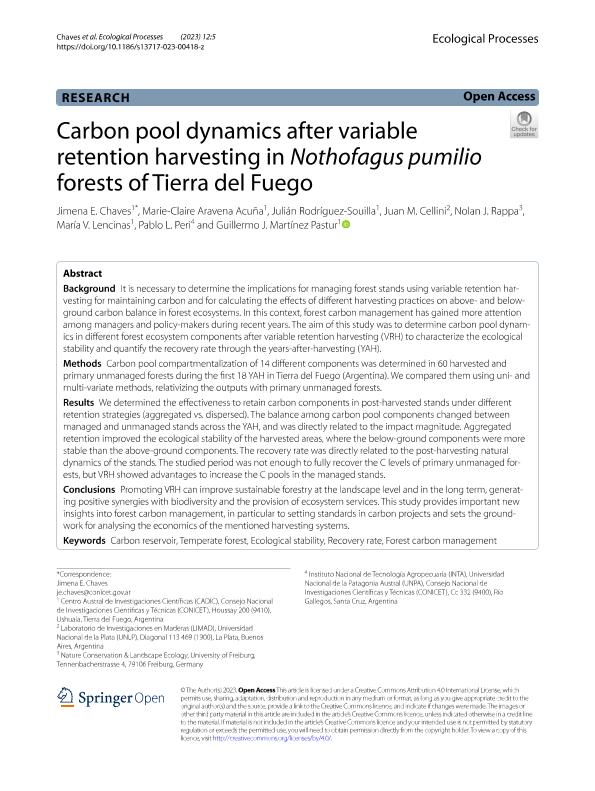Mostrar el registro sencillo del ítem
dc.contributor.author
Chaves, Jimena Elizabeth

dc.contributor.author
Aravena Acuña, Marie Claire Alejandra

dc.contributor.author
Rodriguez Souilla, Julian

dc.contributor.author
Cellini, Juan Manuel

dc.contributor.author
Rappa, Nolan J.
dc.contributor.author
Lencinas, María Vanessa

dc.contributor.author
Peri, Pablo Luis

dc.contributor.author
Martínez Pastur, Guillermo José

dc.date.available
2023-12-11T12:55:35Z
dc.date.issued
2023-12
dc.identifier.citation
Chaves, Jimena Elizabeth; Aravena Acuña, Marie Claire Alejandra; Rodriguez Souilla, Julian; Cellini, Juan Manuel; Rappa, Nolan J.; et al.; Carbon pool dynamics after variable retention harvesting in Nothofagus pumilio forests of Tierra del Fuego; Springer; Ecological Processes; 12; 1; 12-2023; 1-19
dc.identifier.uri
http://hdl.handle.net/11336/219752
dc.description.abstract
Background: It is necessary to determine the implications for managing forest stands using variable retention harvesting for maintaining carbon and for calculating the effects of different harvesting practices on above- and below-ground carbon balance in forest ecosystems. In this context, forest carbon management has gained more attention among managers and policy-makers during recent years. The aim of this study was to determine carbon pool dynamics in different forest ecosystem components after variable retention harvesting (VRH) to characterize the ecological stability and quantify the recovery rate through the years-after-harvesting (YAH). Methods: Carbon pool compartmentalization of 14 different components was determined in 60 harvested and primary unmanaged forests during the first 18 YAH in Tierra del Fuego (Argentina). We compared them using uni- and multi-variate methods, relativizing the outputs with primary unmanaged forests. Results: We determined the effectiveness to retain carbon components in post-harvested stands under different retention strategies (aggregated vs. dispersed). The balance among carbon pool components changed between managed and unmanaged stands across the YAH, and was directly related to the impact magnitude. Aggregated retention improved the ecological stability of the harvested areas, where the below-ground components were more stable than the above-ground components. The recovery rate was directly related to the post-harvesting natural dynamics of the stands. The studied period was not enough to fully recover the C levels of primary unmanaged forests, but VRH showed advantages to increase the C pools in the managed stands. Conclusions: Promoting VRH can improve sustainable forestry at the landscape level and in the long term, generating positive synergies with biodiversity and the provision of ecosystem services. This study provides important new insights into forest carbon management, in particular to setting standards in carbon projects and sets the groundwork for analysing the economics of the mentioned harvesting systems.
dc.format
application/pdf
dc.language.iso
eng
dc.publisher
Springer

dc.rights
info:eu-repo/semantics/openAccess
dc.rights.uri
https://creativecommons.org/licenses/by/2.5/ar/
dc.subject
CARBON RESERVOIR
dc.subject
ECOLOGICAL STABILITY
dc.subject
FOREST CARBON MANAGEMENT
dc.subject
RECOVERY RATE
dc.subject
TEMPERATE FOREST
dc.subject.classification
Ecología

dc.subject.classification
Ciencias Biológicas

dc.subject.classification
CIENCIAS NATURALES Y EXACTAS

dc.title
Carbon pool dynamics after variable retention harvesting in Nothofagus pumilio forests of Tierra del Fuego
dc.type
info:eu-repo/semantics/article
dc.type
info:ar-repo/semantics/artículo
dc.type
info:eu-repo/semantics/publishedVersion
dc.date.updated
2023-12-06T15:17:43Z
dc.identifier.eissn
2192-1709
dc.journal.volume
12
dc.journal.number
1
dc.journal.pagination
1-19
dc.journal.pais
Alemania

dc.journal.ciudad
Berlin
dc.description.fil
Fil: Chaves, Jimena Elizabeth. Consejo Nacional de Investigaciones Científicas y Técnicas. Centro Austral de Investigaciones Científicas; Argentina
dc.description.fil
Fil: Aravena Acuña, Marie Claire Alejandra. Consejo Nacional de Investigaciones Científicas y Técnicas. Centro Austral de Investigaciones Científicas; Argentina
dc.description.fil
Fil: Rodriguez Souilla, Julian. Consejo Nacional de Investigaciones Científicas y Técnicas. Centro Austral de Investigaciones Científicas; Argentina
dc.description.fil
Fil: Cellini, Juan Manuel. Universidad Nacional de La Plata. Facultad de Ciencias Agrarias y Forestales. Laboratorio de Investigaciones en Maderas; Argentina
dc.description.fil
Fil: Rappa, Nolan J.. Albert Ludwigs University of Freiburg; Alemania
dc.description.fil
Fil: Lencinas, María Vanessa. Consejo Nacional de Investigaciones Científicas y Técnicas. Centro Austral de Investigaciones Científicas; Argentina
dc.description.fil
Fil: Peri, Pablo Luis. Consejo Nacional de Investigaciones Científicas y Técnicas; Argentina. Universidad Nacional de la Patagonia Austral; Argentina. Instituto Nacional de Tecnología Agropecuaria; Argentina
dc.description.fil
Fil: Martínez Pastur, Guillermo José. Consejo Nacional de Investigaciones Científicas y Técnicas; Argentina. Consejo Nacional de Investigaciones Científicas y Técnicas. Centro Austral de Investigaciones Científicas; Argentina
dc.journal.title
Ecological Processes
dc.relation.alternativeid
info:eu-repo/semantics/altIdentifier/url/https://ecologicalprocesses.springeropen.com/articles/10.1186/s13717-023-00418-z
dc.relation.alternativeid
info:eu-repo/semantics/altIdentifier/doi/http://dx.doi.org/10.1186/s13717-023-00418-z
Archivos asociados
